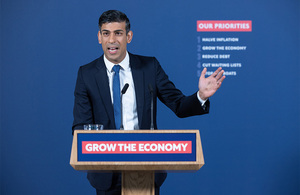Prime Minister outlines his vision for Maths to 18
Prime Minister Rishi Sunak outlines vision to ensure every young person has the maths skills they need to succeed.

- PM outlines vision to ensure every young person has skills they need to succeed
- Higher maths attainment will grow the economy, creating better-paid jobs and opportunity
- New expert group will lead review into how best to deliver maths to 18 for all – but not maths A-Level for all
We must change our anti-maths mindset in order to boost growth, Prime Minister Rishi Sunak said today [Monday 17 April].
Speaking to an audience of students, teachers, education experts and business leaders in North London, the PM argued that maths is vital for providing young people with the knowledge and skills they need to succeed in the jobs of the future.
Despite it being a core skill which is “every bit as essential as reading”, the PM said that the value of maths is often overlooked and poor attainment is regarded as “socially acceptable”.
The Prime Minister said:
We’ve got to change this anti-maths mindset. We’ve got to start prizing numeracy for what it is – a key skill every bit as essential as reading.
…I won’t sit back and allow this cultural sense that it’s ok to be bad at maths to put our children at a disadvantage…
My campaign to transform our national approach to maths is not some nice to have. It’s about changing how we value maths in this country.
In the decade following 2009, the UK has risen 10 places in the international league tables, however we remain one of the least numerate countries in the OECD. More than 8 million adults have numeracy skills below those expected of a 9-year-old and around a third of young people fail to pass GCSE maths.
The PM argued that our future economic growth depends on combating poor numeracy and maximising the potential of all young people. He said:
If we are going to grow the economy not just over the next two years, but the next twenty, we simply cannot allow poor numeracy to cost our economy tens of billions a year or to leave people twice as likely to be unemployed as those with competent numeracy.
We have to fundamentally change our education system so it gives our young people the knowledge and skills they need - and that our businesses need – to compete with the best in the world.
The PM reaffirmed his ambition to ensure that every young person studies some form of maths up to the age of 18. This will not mean every pupil studying maths A-Level. Instead, government will work to ensure that we have the right teaching framework and qualifications in place to deliver maths to 18 in the most effective way for students of all abilities.
A new advisory group, comprising of mathematicians, education leaders and business representatives, will be established to advise government on the core maths content that students need to succeed in future. Taking evidence from countries which have high rates of numeracy and from employers across the country, the group will also advise on whether a new maths qualification is required for 16-18 year olds.
On the process for delivering maths to 18, the PM said:
We will not deliver this change overnight. We’ll need to recruit and train the maths teachers. We’ll need to work out how to harness technology to support them.
And we’ll need to make sure this maths is additional to other subjects – not instead of them. But we are taking the first step today by identifying the maths content that will give our 16-to-18 year olds the skills they need to get on in life”.
The Prime Minister also committed to extending Maths Hubs – unique partnerships of schools and colleges coming together to support maths teaching – as well as introduce a new voluntary and fully funded professional qualification for teachers leading maths in primary schools.